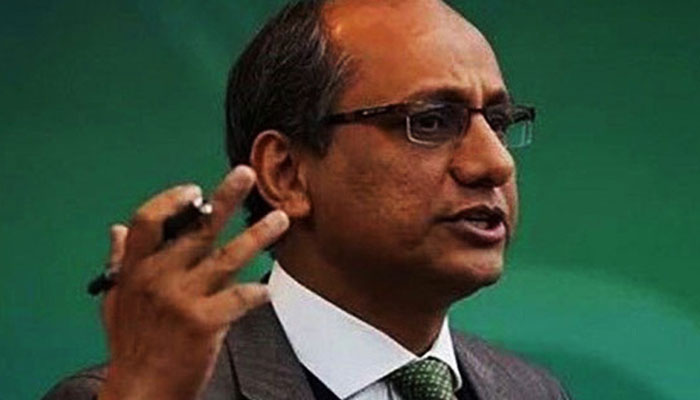Ghani hopes other provinces will follow Sindh in empowering HBWs
Sindh was the first province not only in Pakistan but also in South Asia that passed a law for home-based workers (HBWs) in 2018, giving them the status of recognised workers with social and legal protection like other workers, said the province’s labour minister on Monday.
Saeed Ghani made these observations as the chief guest at an inter-provincial exchange of experiences by parliamentarians and senior government officials on the economic empowerment of HBWs in Pakistan.
The two-day event that will conclude on Tuesday has been organised by the UN Women Pakistan in collaboration with Sindh’s Labour & Human Resource Department (LHRD). The minister said that the Sindh government is now working on the rules of business of the HBWs act and looking to finalising them by mid-March.
“After that, the act will be implemented across the province. I hope that the other provinces also follow the steps taken by Sindh and integrate the best practices and the proven approach to empower HBWs.”
Ingvild Haugland Tokheim, the second secretary (political) of the Royal Norwegian Embassy in Pakistan, said: “I’m glad to see that the home-based workers whom the Norwegian Embassy started to support by partnering with the UN Women Pakistan in 2008 have now been recognised as an integral part of Pakistan’s workforce.”
She added: “The fundamental aim of our gender equality efforts are to increase the opportunities available to women and girls, promote their right to self-determination and further their empowerment.”
UN Women Pakistan Deputy Country Representative Aisha Mukhtar said: “The objective of the two-day sessions is to provide a platform to the provinces to share experiences, gain firsthand knowledge about the challenges and issues faced by HBWs, and incorporate lessons and best practices in your respective provincial plans to empower them.”
LHRD Sindh Secretary Abdul Rasheed Solangi said the provincial government has already recognised HBWs in its policy to formalise the informal sector and resolve their issues.
LHRD Punjab Secretary Sara Aslam said the HBWs bill has also been passed by their cabinet and it will soon be passed by their provincial assembly.
Of the estimated 20 million HBWs in Pakistan, 12 million are women. According to the UN Women’s Status Report 2016 on Women’s Economic Participation and Empowerment in Pakistan, women account for 65 per cent of the Rs400 billion that HBWs contribute to the country’s economy. However, most receive low wages, and are denied legal protection and social security.
The Royal Norwegian Embassy supported a three-year project on ‘Economic Empowerment of Women Home-based Workers and Excluded Groups in Pakistan’.
The project focused on capacity-building and creating linkages with conventional and digital markets for women HBWs and members of excluded groups, such as transgender persons and women with disabilities, as well as advocacy for social protection and policy advocacy for legislation on their social and economic empowerment.
Khyber Pakhtunkhwa Information Minister Shaukat Yousafzai, Gender Mainstreaming Committee Punjab Chairperson MPA Uzma Kardar, KP Women Parliamentary Caucus Chairperson Maliha Asgher Khan, LHRD Balochistan and KP secretaries, and senior officials from government departments, the UN Women and partner organisations also participated in the event on its first day.
-
 Man Convicted After DNA Links Him To 20-year-old Rape Case
Man Convicted After DNA Links Him To 20-year-old Rape Case -
 Royal Expert Shares Update In Kate Middleton's Relationship With Princess Eugenie, Beatrice
Royal Expert Shares Update In Kate Middleton's Relationship With Princess Eugenie, Beatrice -
 Andrew Mountbatten-Windsor’s Leaves King Charles With No Choice: ‘Its’ Not Business As Usual’
Andrew Mountbatten-Windsor’s Leaves King Charles With No Choice: ‘Its’ Not Business As Usual’ -
 Dua Lipa Wishes Her 'always And Forever' Callum Turner Happy Birthday
Dua Lipa Wishes Her 'always And Forever' Callum Turner Happy Birthday -
 Police Dressed As Money Heist, Captain America Raid Mobile Theft At Carnival
Police Dressed As Money Heist, Captain America Raid Mobile Theft At Carnival -
 Winter Olympics 2026: Top Contenders Poised To Win Gold In Women’s Figure Skating
Winter Olympics 2026: Top Contenders Poised To Win Gold In Women’s Figure Skating -
 Inside The Moment King Charles Put Prince William In His Place For Speaking Against Andrew
Inside The Moment King Charles Put Prince William In His Place For Speaking Against Andrew -
 Will AI Take Your Job After Graduation? Here’s What Research Really Says
Will AI Take Your Job After Graduation? Here’s What Research Really Says -
 California Cop Accused Of Using Bogus 911 Calls To Reach Ex-partner
California Cop Accused Of Using Bogus 911 Calls To Reach Ex-partner -
 AI Film School Trains Hollywood's Next Generation Of Filmmakers
AI Film School Trains Hollywood's Next Generation Of Filmmakers -
 Royal Expert Claims Meghan Markle Is 'running Out Of Friends'
Royal Expert Claims Meghan Markle Is 'running Out Of Friends' -
 Bruno Mars' Valentine's Day Surprise Labelled 'classy Promo Move'
Bruno Mars' Valentine's Day Surprise Labelled 'classy Promo Move' -
 Ed Sheeran Shares His Trick Of Turning Bad Memories Into Happy Ones
Ed Sheeran Shares His Trick Of Turning Bad Memories Into Happy Ones -
 Teyana Taylor Reflects On Her Friendship With Julia Roberts
Teyana Taylor Reflects On Her Friendship With Julia Roberts -
 Bright Green Comet C/2024 E1 Nears Closest Approach Before Leaving Solar System
Bright Green Comet C/2024 E1 Nears Closest Approach Before Leaving Solar System -
 Meghan Markle Warns Prince Harry As Royal Family Lands In 'biggest Crises' Since Death Of Princess Diana
Meghan Markle Warns Prince Harry As Royal Family Lands In 'biggest Crises' Since Death Of Princess Diana




